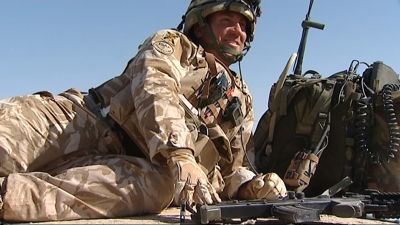Insight
Afghanistan: The sacrifices of British soldiers are being undone by a hasty US pull-out

Fighting in Afghanistan’s long-running conflict against the Taliban has escalated dramatically since May, when the US-led military coalition began the final stage of a withdrawal set to be completed before the end of the month.
In recent days a string of provincial capitals have fallen to the insurgents as they battle to regain control of Afghanistan.
As 20 years of work by coalition forces looks set to be undone in a matter of months, ITV News Correspondent Geraint Vincent - who filmed with UK forces in Helmand province in 2009 - reflects on the situation the country finds itself in.
Whenever I think of Afghanistan, I think of Sergeant Stuart ‘Gus’ Millar. Teak-tough and lion-hearted, he was a superb soldier. I got to know him a little bit over a few days I spent with the Black Watch battalion from the Royal Regiment of Scotland in Helmand Province in 2009.
They were involved in some heavy fighting against Taliban insurgents. I joined them as they scrapped their way into a small town not far from Lashkar Gah.
In 2009, Geraint Vincent travelled to Helmand Province where he spent several days with the Black Watch battalion as they battled the Taliban
It was the first time I had been anywhere near actual bullets flying through the air, and I was terrified. And I must have looked it. Gus produced a packet of Haribo and offered me one. “Good for morale”, he said.
Camera operator Dave Harman captured Gus the next morning in the middle of a firefight, complaining that the Taliban had interrupted his breakfast.
We interviewed him later that day, and he showed us a treasured photograph of his two-year-old daughter, Gracie.
Gus was killed in action three months later. The platoon was hit by a rocket propelled grenade.
Gus Millar told ITV News of how much he was looking forward to seeing his daughter when he returned home from his tour of Afghanistan. He never did.
When the medics got to him, he told them to attend to the other injured men. He knew the severity of his wounds had put him beyond help. Even as he lay dying, he was helping his comrades. Such was the quality of soldier we sent to fight and die in Afghanistan.
Gus was one of 456 British service personnel who gave their lives there.
The US-led, Nato coalition lost 3,500 troops. $2 trillion (£1.44 trillion) were spent on the mission. And now, as the last of those forces prepare to withdraw completely from the country, I find myself asking: "What was it all for?"
Well, quite a lot actually. British soldiers were first sent to Afghanistan in the aftermath of 9/11 to root out the terrorists of Al-Qaeda. No terror attack has been launched from the country ever since. The Afghan people have had 20 years free of the brutality of Taliban government. Women and girls have been able to go to school, and go on to get jobs and live full lives. There has been theatre, art and sport. There is now an Afghan national cricket team - and it’s pretty good.
Gus Millar's funeral took place in the church he was married in just one year before his death
Sadly though, there have been plenty of terror attacks launched by the Taliban in Afghanistan itself. And now the Taliban is regaining territory across the country, including that where Gus and so many other British soldiers shed their blood, Helmand Province.
The Afghan government looks so fragile in the face of the offensive, its armed forces are fighting for the country’s life.
I went back to Helmand several times after I met Gus, always to spend time with British soldiers on operations there. Their officers were always clear that their mission was to keep out the insurgency, and establish safe spaces for the Afghan government to establish itself.
"You may have the watches, but we have the time," was the famous Taliban taunt in response. And they are being proven right. It takes time to build a government. An effective civil service and functioning democracy do not happen happen overnight. Societies terribly damaged by totalitarianism and war need to be nurtured and protected.
Allied forces stayed in Germany for generations after the Second World War. In Korea, there are still 30,000 American troops stationed on the border between North and South, nearly 70 years after the fighting stopped. But in Afghanistan, America’s political leaders have decided that their commitment must come to an end. The vast cost of nation-building in the country is something they can no longer bear.
They have even been negotiating with the Taliban, the men who brought such darkness to Afghanistan and now threaten to do so again.
Gus did not die in vain, his sacrifice and that of so many others helped to give a blighted country a glimpse of a better future. But because of a lack of political will, the task of building a safer society in Afghanistan is being abandoned, when it’s only just begun.
Read more stories from our series Afghanistan: Photo From The Frontline